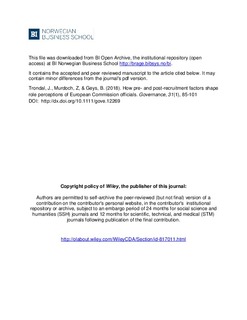How pre- and post-recruitment factors shape role perceptions of European Commission officials
Journal article, Peer reviewed
Permanent lenke
http://hdl.handle.net/11250/2472816Utgivelsesdato
2018Metadata
Vis full innførselSamlinger
- Publikasjoner fra CRIStin - BI [1015]
- Scientific articles [2181]
Originalversjon
Governance. An International Journal of Policy, Administration and Institutions, 2018, 31(1), 85-101 http://dx.doi.org/10.1111/gove.12269Sammendrag
Individuals' role perceptions are central guides to their behavior and choices as members of an organization. Understanding organizational dynamics thus requires knowledge about the determinants of such role perceptions, as well as whether—and when—organizations can influence them. This article brings forward a theoretical framework allowing for both prerecruitment (extraorganizational) and post-recruitment (intraorganizational) determinants of individuals' role perceptions, and examines its empirical implications using a large-N data set of temporary officials in the European Commission. We find that intergovernmental and epistemic role perceptions are strongly linked to pre-recruitment factors (such as educational and professional background), whereas postrecruitment factors (such as length of affiliation and embeddedness within the Commission) are the main driving force behind supranational and departmental role perceptions. This heterogeneity in the importance of pre- and postrecruitment factors for distinct role perceptions has important consequences for conceptualizing organizational change.
Beskrivelse
The accepted and peer reviewed manuscript to the article
